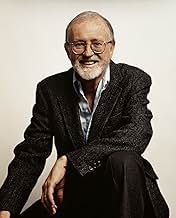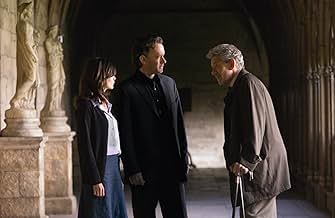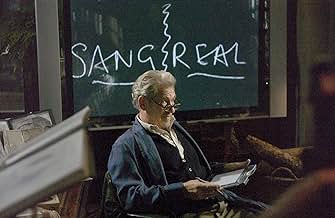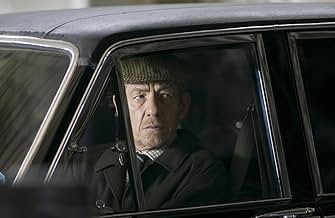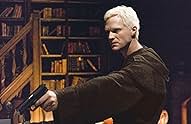Un asesinato en el interior del Louvre y pistas en las pinturas de Da Vinci, llevaron al descubrimiento de un misterio religioso protegido por una sociedad secreta durante dos mil años, que ... Leer todoUn asesinato en el interior del Louvre y pistas en las pinturas de Da Vinci, llevaron al descubrimiento de un misterio religioso protegido por una sociedad secreta durante dos mil años, que podría sacudir los cimientos del cristianismo.Un asesinato en el interior del Louvre y pistas en las pinturas de Da Vinci, llevaron al descubrimiento de un misterio religioso protegido por una sociedad secreta durante dos mil años, que podría sacudir los cimientos del cristianismo.
- Dirección
- Guionistas
- Elenco
- Premios
- 8 premios ganados y 21 nominaciones en total
- Docent
- (as Andrew Clark)
- Dirección
- Guionistas
- Todo el elenco y el equipo
- Producción, taquilla y más en IMDbPro
Opiniones destacadas
As a work of history, the novel is a passel of nonsense, and only those with a bent towards conspiracy theory overload would be foolish enough to believe a minute of it. But as a work of imaginative fiction, "The Da Vinci Code" certainly gives its audience the neck-twisting workout they've paid good money to receive.
It would be pointless to reiterate the plot of a novel that has probably had the biggest readership of any literary work since "Gone With the Wind." Suffice it to say that a mysterious murder in the Louvre sends a Harvard symbologist and the dead man's granddaughter on a clue-driven search for the famed Holy Grail. Along the way, the two uncover a grand conspiracy on the part of a renegade Catholic order to protect a secret that, if it were revealed, could shake the whole of Western civilization down to its very foundations.
Despite the phenomenal - one is tempted to say "unprecedented" - commercial success of his work, Dan Brown is no great shakes as a writer; his characters are, almost without exception, drab and two-dimensional, and his dialogue, when it isn't being overly explicit in pouring out explanations, sounds like it was written by a first-year student in a Writer's 101 workshop. But the one undeniable talent Brown does have is his ability to knit together a preposterously complex web of codes and clues into an airtight tapestry, and to make it all convincing.
The movie is very faithful to the novel in this respect. It moves quickly from location to location, never giving us too much time to question the logic (or illogic) of the narrative or to examine the many gaping plot holes in any great detail. Writer Akiva Goldsman has encountered his greatest trouble in the scenes in which the action stops dead in its tracks so that the characters can lay out in laborious detail the elaborate story behind the clues. Yet, this is as much the fault of the nature and design of the novel as it is of the man given the unenviable task of bringing it to the screen. Moreover, perhaps in the interest of time and keeping the action flowing, Robert and Sophie come up with solutions to the myriad riddles much too quickly and accurately, with a "Golly, gee, could it mean_______?" attitude that borders on the ludicrous. But, somehow, Howard makes most of it work. Perhaps, it's the clunky literal-minded earnestness with which he approaches the subject that ultimately allows us to buy into it against our better judgment.
Tom Hanks is stolid and passive as Dr. Robert Langdon, the college professor involuntarily driven into all this cloak-and-dagger intrigue, but Audrey Tautou has a certain subtle charm as Sophie, the woman who may play more of a part in the unraveling of the mystery than even she herself can imagine. Jean Reno and Paul Bettany have their moments as two of the less savory players in the story, but it is Ian McKellen as Sir Leigh Teabing, an expert on all things related to the Holy Grail, who walks off with the film. His scenery-chewing shtick pumps some much needed life into a tale essentially populated by underdeveloped stick figures.
The religious controversy surrounding both the novel and the film is as ludicrous as it is unjustified. Anyone whose belief system could be seriously shaken by this absurd mixture of unsubstantiated myth-making and plain old-fashioned wild speculation couldn't have had a very solid foundation of faith to begin with.
The rest of us can appreciate "The Da Vinci Code" for what it is, an overblown but epic exercise in code-busting and clue-decoding - in short, the "Gone With the Wind" of whodunits.
American symbologist Robert Langdon (Tom Hanks) and French cryptologist Sophie Neveu (Audrey Tautou) are on a trans-European quest to solve riddles left by Louvre curator, Langdon's hero and Neveu's grandfather, Jacques Saunier, as he lay dying. The riddles and subsequent quest allegedly lead to the true identity and whereabouts of the famed Holy Grail. Hot in pursuit of the thinking man's Bonnie and Clyde is Javert-ian French police captain Bezu Feche (Jean Reno), intent on pinning the murder of Suanier on Langdon and Neveu, and albino monk, Silas (Paul Bettany) under the command of a mysterious telephone voice known only as The Teacher.
With a pedigree such as the most popular book in the world, two Academy Award winners (Hanks, Howard and writer Akiva Goldsman), French film superstars (Tautou and Reno) and Gandalf (Ian McKellen), you'd wonder how such a film could fail.
Well, how about the miscast of Howard as director. Howard lacks the vision to properly adapt the novel and bring it to life. Some of the blame does go to his Cinderella Man scribe Akiva Goldsman for not writing a fitting script. But Howard's awkwardness is more prominent. If we were going to pick name directors for this film, Steven Spielberg would have been better choice, but I think David Fincher (Se7en and Fight Club) would have been perfect.
The whole production felt rushed. Having just read the book, a lot of plot points were fresh in my mind, and that may have clouded the comprehension of certain things, which I think Howard and Goldsman were counting on. Looking back on it, the first 30-45 minutes were very rushed, and I don't think things were adequately explained. They were still referenced and used in the movie, but not explained well. It suffered from the, what I call, Godfather syndrome: referencing things from the book at the wrong time. They could have taken their time with the film, and it would have told the same story, and been a lot better.
Hanks was out of place as Landon, our hero. He doesn't have or project the same presence about him that Langdon should have. Might I suggest seasoned conspiracy theory veteran David Duchovny? As with Mission:Impossible:III, the supporting cast was impeccably put together, and the one true weakness of the cast is unfortunately the keystone (maybe it's just a bad year for actors named Tom).
Slightly better than your average summer fair, but still doesn't hold up when put against the equally action oriented yet wholly more insightful X-Men franchise.
However, years later around three years ago I caught it for the first time on basic cable, and I honestly didn't see what all the criticism was for. Not only was it immersive and intriguing, for the most part, but it had a pretty powerful ending and reveal at the end. It isn't great, so maybe the hype was what triggered so many negative reviews, but it also isn't bad.
I never read the whole book, but understood the premise. If you really want to enjoy this film, you probably should set the book aside and set beside any offense you may take as to the religious conjecture, and just view it as a mystery movie in and of itself. I really enjoyed the ending- the whole final fifteen minutes or so.
7.8/10
A lot of people are too harsh on this one. Mostly because they know the book and have very high expectations. I have to see my first book-to-film where the film is better.
Also, you're not going to hell for watching this movie or reading the book. It's based on a novel, which is based on a few loose theories, but in the end all it wants to do is to entertain. And that is exactly what both the book and the movie did for me.
¿Sabías que…?
- TriviaAudrey Tautou revealed that, during her audition, she asked if she could take a photo of Ron Howard and Tom Hanks to prove that she'd actually met them.
- ErroresThere was no need to know the capsule's combination in order to open it as vinegar is easily frozen in a household freezer. Simply freeze the capsule and then smash it open to reveal the internal message.
- Citas
Robert Langdon: You say you hate history. Nobody hates history. They hate their own histories.
Sophie Neveu: So now you're a psychologist too?
- Créditos curiososThe "A" and "V" in the film title are replaced with the "Blade" and the "Chalice" symbols described by Langdon in the movie.
- Versiones alternativasThe film was originally shown to the UK censors in an unfinished form, with a temp score and sound mix. The BBFC advised Sony Pictures that sound levels during some acts of violence may be too impactful for the requested "12A" rating, so the film was likely to receive a 15 classification. When formally submitted, the final levels of sound effects on the completed soundtrack had reduced the strength of some acts of violence to an extent which made the film able to get a "12A" rating.
- ConexionesFeatured in The Amazing Race: Herculean Effort for Some Herculean Dudes (2006)
Selecciones populares
Detalles
- Fecha de lanzamiento
- Países de origen
- Sitios oficiales
- Idiomas
- También se conoce como
- The Da Vinci Code
- Locaciones de filmación
- Productoras
- Ver más créditos de la compañía en IMDbPro
Taquilla
- Presupuesto
- USD 125,000,000 (estimado)
- Total en EE. UU. y Canadá
- USD 217,536,138
- Fin de semana de estreno en EE. UU. y Canadá
- USD 77,073,388
- 21 may 2006
- Total a nivel mundial
- USD 760,200,455
- Tiempo de ejecución
- 2h 29min(149 min)
- Color
- Mezcla de sonido
- Relación de aspecto
- 2.39 : 1







